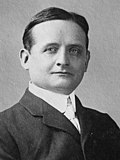January 11, 1910 | ||||||||||||||||
| ||||||||||||||||
| ||||||||||||||||
| Elections in Massachusetts |
|---|
 |
The Boston mayoral election of 1910 occurred on Tuesday, January 11, 1910. John F. Fitzgerald, who had been Mayor of Boston from 1906 to 1908, defeated incumbent George A. Hibbard and two other candidates. [1]
Contents
This was the first Boston mayoral election held under a new city charter, [2] which made the election nonpartisan, and increased the mayor's term from two years to four years. [3] Due to November voting on the charter change, this election was held in January, with the term of the incumbent mayor extended into February. [4]
Fitzgerald was inaugurated on Monday, February 7. [5]

